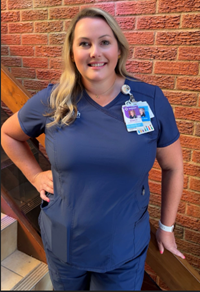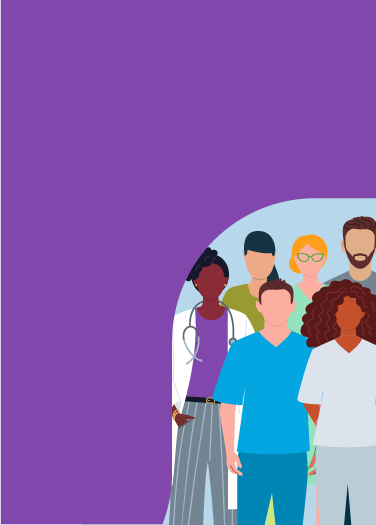
Diversity, Equity, Inclusion & Belonging
At Wellstar, diversity, equity, inclusion and belonging support our mission of enhancing the health
and well-being of every person we serve. Embracing and respecting the unique aspects of our patients,
employees, and the communities where we all live reflects our values
of serving with compassion, pursuing excellence and honoring every voice.
Diversity, Equity, Inclusion & Belonging at Wellstar
Wellstar Health System’s Office of Diversity, Equity, Inclusion and Belonging (ODEIB) is responsible for the system-wide design, development, strategic planning, and implementation of actions to impact workforce diversity, a culture of inclusion, building cultural competence, promoting health equity, improving community engagement, and enhancing supplier diversity.
When we speak a common language, we learn and grow together.
Chief Executive Officer Commitment Statement

Wellstar does not tolerate racism or discrimination of any kind. At Wellstar, we are focused on the positive ways we can impact the lives of our physicians, caregivers, and team members, as well as the patients and communities we serve – both today and into the future – through the Wellstar Diversity, Equity, Inclusion and Belonging (DEIB) program.
Fostering a culture that respects and honors every voice is the responsibility of every member of the Wellstar team. Our DEIB program is threaded throughout the fabric of our organization, and is evident through the work and efforts of our 30,000 plus team members from across the health system. We remain steadfast in our commitment to six key areas of focus as we move forward – advancing workforce diversity, creating a culture of inclusion, building cultural competence, promoting health equity, improving community engagement, and enhancing supplier diversity.
I am proud to be part of the Wellstar team, and I am proud of the great diversity, equity, inclusion and belonging work continuously happening across our healthcare system.
We recognize that addressing health disparities and standing against all forms of racism and discrimination is an ongoing journey. We pledge to be difference makers and work collaboratively both inside and outside the walls of our care sites as we build a more just and equitable world through our continued commitment to learn, educate and drive positive change for our communities and the Wellstar team.
Sincerely,
Candice L. Saunders
President & CEO
Chief Diversity, Equity and Inclusion Officer Commitment Statement
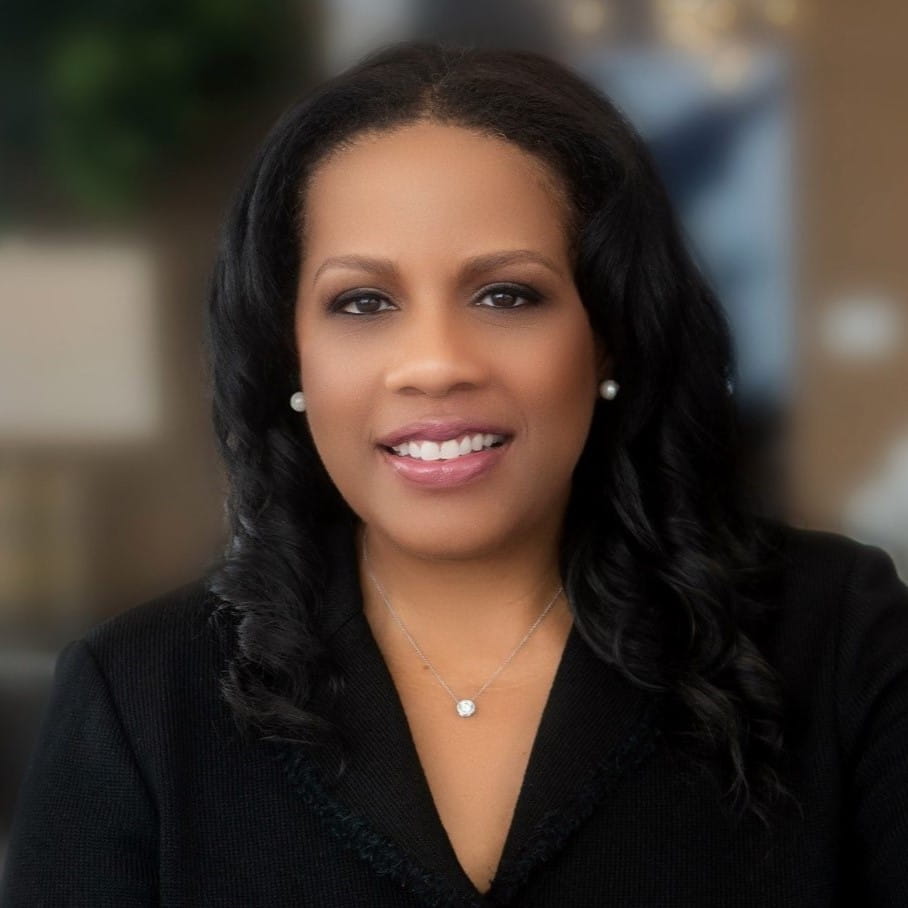
Wellstar Health System Office of Diversity, Equity, Inclusion and Belonging (ODEIB) upholds the importance of our core value of honoring every voice and is committed to fostering a culture where everyone can thrive and feel like they belong.
Our efforts and work in elevating DEIB throughout the health system are intentional. We earnestly listen to team members, patients and their families and respect their lived experiences.
The office is responsible for creating the strategic framework to advance DEIB, integrate best practices throughout the system, and evaluate progress. Our priorities and partnerships sustain our endeavors as we create, develop, and implement initiatives to improve workforce diversity, increase cultural competency, strategically impact health equity, elevate community engagement, and support supplier diversity.
We value the unique perspectives, backgrounds, and ideals of all who come through our doors to seek and provide healthcare. By leveraging our similarities and differences, collectively, we create healthier communities and an engaged, diverse workforce that learns and grows while providing our patients world-class healthcare.
At Wellstar, we are committed to being difference makers and believe the opportunity to have the best in healthcare belongs to everyone.
Sincerely,
Le Joyce Naylor
Senior Vice President and Chief Diversity, Equity & Inclusion Officer
Our Workforce
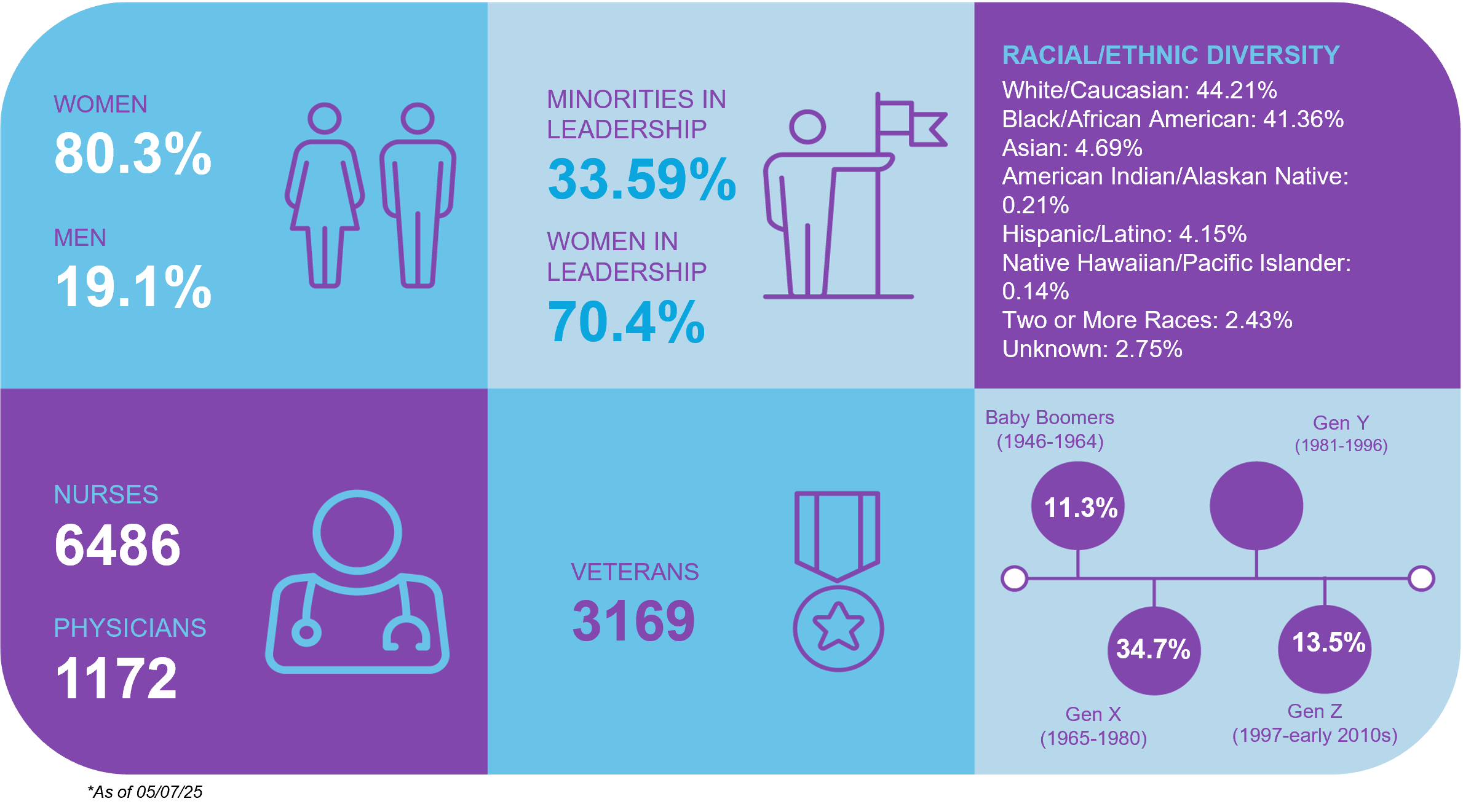
Business Resource Groups and Inclusion Councils
Business Resource Groups (BRGs) and Inclusion Councils (ICs) represent Wellstar by serving as ambassadors and champions of the health system’s diversity, equity, inclusion, and belonging strategy. Their strategic programming for physicians and team members builds cultural competency and increases awareness of the healthcare and wellness needs of our diverse patient, team member and community populations. ODEIB supports and advises the system-wide Business Resource Groups and location-specific Inclusion Councils.
Our Business Resource Groups:
|
Our Inclusion Councils:
|
What is Diversity, Equity, Inclusion and Belonging?
DiversityRefers to characteristics that make us unique. These include but are not limited to gender, gender identity, ethnicity, race, age, generation, culture, religion, belief system, marital status, parental status, language and accent, disability, education, military status, job role, job experience, thinking style, and personality.
Equity
Refers to the practice of ensuring fairness in access and opportunity. Equity allows for everyone to reach their full potential. Equity should not be confused with equality, which does not always show up as the same treatment and opportunity for all.Inclusion
Refers to how we intentionally include and leverage those differences in our relationships, processes, and actions to create an equitable, healthy, and high-performing organization. Inclusion enables individuals to feel safe, respected, engaged, motivated, and valued for their contributions and who they are.Belonging
Refers to the positive feeling when individuals experience inclusion, equity, and diversity are optimized, allowing them to bring their best and authentic selves forward.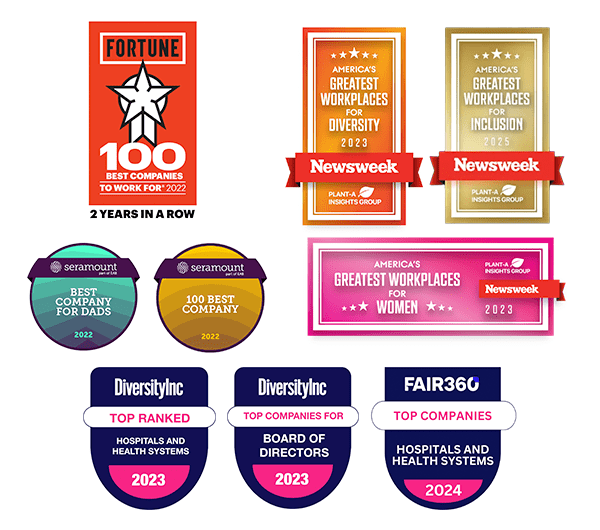
Ally
Refers to an individual who recognizes their privilege (based on class, gender, race, etc.) and works support, amplify, and advocate with others, especially with individuals who don’t belong to the same social/cultural identity groups as themselves.Cultural Competency
Refers to the integration of behaviors, attitudes, policies, and practices that enable professionals to function effectively across cross-cultural situations. Culturally competent organizations respect and value diversityCultural Humility
The ongoing process of self-awareness and accountability with a willingness to learn from others while challenging your own cultural biases. It is the realization that we cannot possibly know everything about other cultures, and approaches learning about other cultures as a lifelong goal and processCultural Sensitivity
Is being aware and accepting of cultural differences. It implies that you withhold judgment of cross-cultural practices, and that you can deal effectively with these differences.DEIB
Refers to diversity, equity, and inclusion practices, policies, and actions with a reflection on their resulting positive impact - an experience of belongingHealth Equity
Refers to the state of being where everyone has a fair opportunity to be as healthy as possible. Health equity is achieved through by removing barriers to quality healthcare access such as poverty, discrimination and racismUnconscious Bias
Refers to a bias or prejudice held, recognized, and perhaps acted upon without the individual’s conscious awareness. The terms unconscious bias and implicit bias are sometimes used interchangeably.Why is Belonging and Inclusion Important to our Wellstar Team Members and Patients?
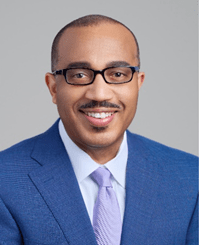
David A. Jones, Executive Vice President/CHRO
At Wellstar, belonging and inclusion are more than concepts—they are a critical part of how we live our mission and deliver on our vision every single day. Our mission is to enhance the health and well-being of every person we serve. That starts by building an inclusive culture where our team members feel seen, heard, and valued. When people experience a true sense of belonging at work, they bring more purpose, creativity, and compassion to their roles. That kind of culture does not just benefit our teams, it directly shapes the patient-centered care we deliver. Inclusion and belonging foster trust, safety, and connection, creating the conditions for team members to show up fully, speak up with confidence, and deliver their best work in a complex healthcare environment. By building a culture where everyone, across all roles, backgrounds, and identities feels included, we are not only supporting our team members; we are improving outcomes, strengthening communities, and delivering world-class care. Because when our people thrive, our patients do too.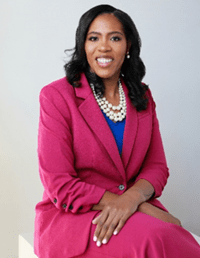
Dr. Alicia Shelly, MD, Internal Medicine Douglas
As a physician, I have come to understand that delivering exceptional, patient-centered care is deeply connected to how we, as healthcare providers, feel within our professional environment. At Wellstar, the sense of belonging among team members isn’t just encouraged—it is cultivated. This culture of inclusion empowers us to bring our authentic selves to work, fostering trust and collaboration that directly benefit our patients. My involvement with the Underrepresented Physicians Business Resource Group has been instrumental in this journey. Through this BRG, we create spaces for mentorship, shared experiences, and mutual support among colleagues who understand the unique challenges we face. These connections have not only enriched my professional life but have also enhanced the care I provide. When physicians feel seen and supported, we are better equipped to listen, to empathize, and to meet our patients where they are. Belonging is not a passive experience—it is an active commitment. At Wellstar, that commitment translates into a healthcare environment where diversity is celebrated, equity is pursued, and every team member has the opportunity to thrive. For those considering a career at Wellstar, know that you will be joining a community that values your voice, supports your growth, and recognizes that our collective strength lies in our shared commitment to each other and to the patients we serve.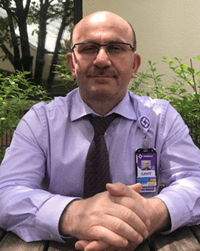
Cavit Agu, Chaplain, Spiritual Health
As a spiritual health leader, I have seen firsthand how deeply the sense of belonging and inclusion impacts both our team members and the patients we serve. In Islam, the concept of Rahmah, or divine mercy and compassion, teaches us that every person is worthy of care, dignity, and connection. It is a call to see others fully—to honor their stories, their identities, and their worth. At Wellstar, this is what we strive for, caring for the whole person: mind, body, and spirit. Belonging and inclusion are not just abstract values; they are lived experiences that shape how we care for one another. When team members feel included and supported, it gives them strength to show up fully, care deeply, and find meaning in their work. And when patients encounter care that respects their faith, culture, and humanity, it fosters deeper trust and healing. Especially for those from underrepresented communities, inclusion can be the bridge between fear and hope. Belonging is not separate from our mission—it is central to it. To enhance the health and well-being of every person we serve, we must first see every person as worthy, whole, and beloved. Healing begins with connection—and connection begins with belonging.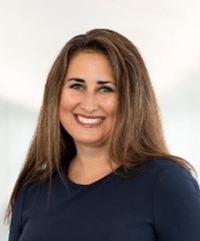
Kristine Adams, VP and Chief Nursing Officer, WMG
In nursing, everything we do begins and ends with the patient. Inclusion and belonging in nursing allow for a richness in cultural backgrounds, viewpoints, and unique considerations in caring for patients. Belonging in nursing means knowing your contributions matter. It means feeling safe to ask questions, offer ideas, and lean on your team during difficult shifts. We also know that when patients see nurses who look like them, it creates a sense of belonging, which leads to better engagement in care and improved health outcomes. By including all nurses who are committed to patient-centered care, we create common ground that fosters trust and healing. At Wellstar, we know that when nurses feel they belong, they lead with purpose, uplift others, and provide care with heart.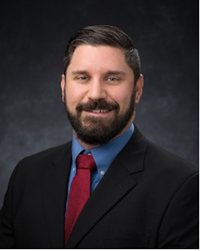
Adam Clark, Director Practice Operations, Co-Chair, PRIDE Collective BRG
At Wellstar, belonging is something we actively build together, and our Business Resource Groups are one the most powerful ways we do that. As Co-chair for the Pride Collective BRG, I get to work with team members to create space for engagement, visibility, and voice of our LGBTQIA+ team members, allies, and community. We bring together team members from across roles, backgrounds, and identities to celebrate culture, share experiences, provide support, and give back to the community. Whether you are finding community, deepening cultural awareness, or helping to shape an inclusive workplace, BRGs are where belonging becomes action. The BRGs play a critical role in our mission. They help ensure that every team member feels valued and heard, which directly supports the compassionate, patient centered care we provide. When people feel a sense of community at work, they show up with more purpose, more PRIDE, and more presence for each other, for our patients, and our communities. At Wellstar, BRGs remind us that none of us are alone – and that every voice adds value in shaping an inclusive, patient-centered culture where everyone belongs.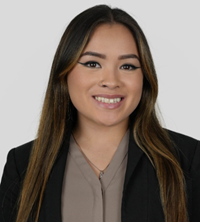
Jessi Tran, MHA (previous Wellstar Fellow and current Operations Manager)
Before I applied to become an Administrative Fellow at Wellstar, I spent time reading the DEIB page on the website; watching stories from team members, learning about the culture, and asking myself, “Is this a place where I’ll feel like I belong?” What I saw was a health system that valued people not just for what they do, but for who they are. And that mattered to me. It is what made me want to take the next step. When I joined as a Fellow, that sense of belonging became real. I wasn’t just welcomed, I was included, supported, and encouraged to grow. I had mentors who believed in me, leaders who made space for my voice, and teammates who helped me learn every day. Now, as an Operations Manager, I carry those same values forward—creating space for others just as it was created for me. I actively seek opportunities to stay engaged in DEIB efforts, including being part of our Business Resource Groups for Young Professionals and the AAPI community. I show up to work as my whole, authentic self—and I strive to create an environment where others feel empowered to do the same. Because when you truly feel like you belong, you lead with confidence, learn with purpose, and show up fully—for your team, and for our patients.